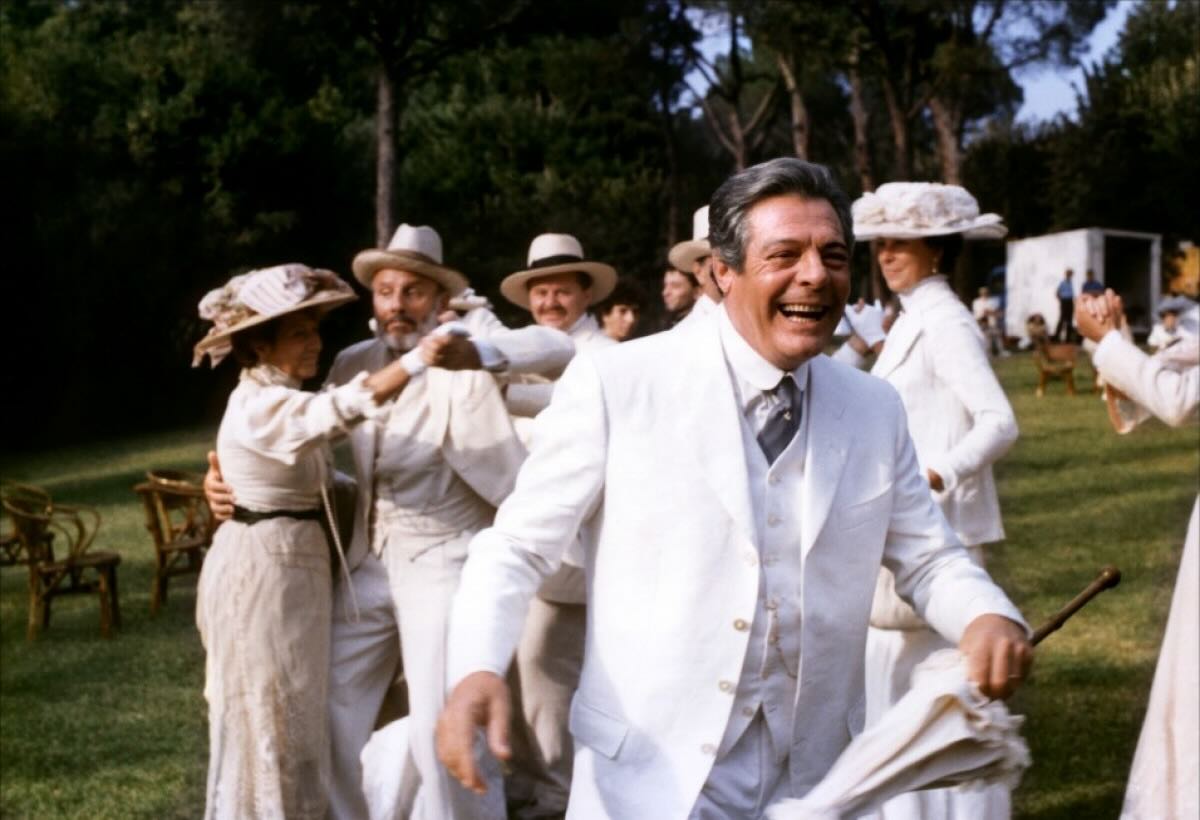One amongst a number of Italian-Soviet co-productions, including Eldar Ryazonov’s Unbelievable Adventures of Italians in Russia (1974), and, in its own way, Andrei Tarkovsky’s Nostalghia (1983), Dark Eyes (1987), directed by Nikita Mikhalkov, is a late-career Marcello Mastroianni feature of little renown. As in the more celebrated White Nights (1957), Mastroianni again stars in an adaptation derived from the work of a Russian literary giant, except that this time it’s Anton Chekhov rather than Fyodor Dostoevsky. A mixed Italian-Soviet cast and crew made and starred in the film, respectively; additionally, it boasts the notable collaboration of Suso Cecchi D’Amico as screenwriter.
Dark Eyes is structured as a series of flashbacks—loosely inspired by the short stories of Chekhov, most notably among them “Lady with a Lapdog”—pertaining to a conversation that takes place on a ship between two men, an Italian and a Russian, respectively Romano Patroni (Mastroianni) and Pavel Alekseev (Vsevolod Larionov). Romano recounts a love story—his doomed encounter with Anna Sergevena (Elena Sofonova)—that took place in an unretrievable past, but nevertheless left an indelible mark. To this end, Mikhalkov displays a sensitivity for long, deep shots; at different points in the film, we look down endless series of open doors, or at figures retreating down long garden paths, and our eyes endlessly recede into a past that Romano could never fully exorcise.
Mikhalkov is concerned with the reconciling of differences. The two men come from different backgrounds, different countries, and speak different languages, but over time these differences collapse. At the very start of the film, Mastrionni’s character remembers how to say sobachka! (little dog) in Russian. This word not only unifies disparate parts of the narrative, but helps the two men conversing reach mutual understanding. Their reconciliation speaks to a preoccupation that hovers in the background of many Soviet-Italian films, which frequently assume an innate opposition between the two countries by counterposing West and East, Catholicism and Orthodoxy, capitalism and communism, renaissance and regression. Here, such dichotomies—false and otherwise—pass unremarked upon, or, they exist to be overcome. Almost, at least.
The film nearly ends with Pavel and Romano talking, in a mixture of Russian and Italian, through floods of tears that universalize the human experience of love and loss beyond national and linguistic barriers. But, before the film can end, the possibility of final, mutual comprehension is undercut. It is revealed that Romano is (only!) an employee on the boat and Pavel is, in fact, Anna’s husband. Despite previously gesturing at unity, Mikhalkov reveals irreconcilable differences in spheres central to both Italian and Soviet cultural tradition: love and class.
Tales of star-crossed lovers are always at least somewhat moving, but here, as is frequently the case, everything diminishes in significance next to Mastroianni’s performance. He compulsively charms even at the end of his career, red-nosed and crêpey-skinned. His raw physicality is best expressed in his dancing, which practically serves as a career-spanning motif—see Federico Fellini’s 8 1/2 (1964), White Nights, and Ettore Scola’s A Special Day (1977). His bouncing, long-legged strides overcome the distance between films, even as they change between them—from the awkwardness of youth in White Nights, to the disaffected cool of 8 1/2. His dancing in Dark Eyes serves as a reminder of Mastroianni’s strange, eternal youthfulness, which persists in spite of his age. But there is also something bittersweet about his dancing here, which presents itself as an expression of a joy now diminished and unreachable—a jerky, clumsy denouement to a final, tear-streaked monologue. Seeing Mastroianni cry in close-up feels almost voyeuristic on account of the vulnerability he shows. The past might not be able to be reclaimed, but there remains something of it still in Mastroianni’s eyes, which still flash in the same way as when he was young.
Dark Eyes screens this Friday, February 21, at BAMPFA as part of the series “Marcello Mastroianni at 100.”



